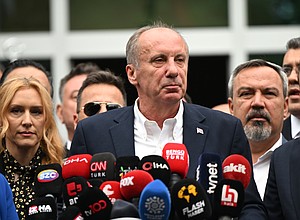5/11/2023

Originally Published: 11 MAY 23 07:41 ET
Updated: 11 MAY 23 09:58 ET
By Isil Sariyuce, Gul Tuysuz and Nadeen Ebrahim, CNN
(CNN) -- Turkish presidential candidate Muharrem Ince has pulled out of the race, in a potential boost to President Recep Tayyip Erdogan's rival, Kemal Kilicdaroglu, ahead of Sunday's vote.
Ince had low polling numbers and some opposition figures feared he would split the anti-Erdogan vote.
"I am pulling out of this race. I am doing this for my country," he said at a press conference in Ankara, adding that he had faced a "slander campaign." Ince's name will however remain on the ballot.
"I don't want them to blame me when they lose," he said referring to the main opposition.
His centrist party, Homeland, will remain in the parliamentary race. "I urge each household to give Homeland Party at least one vote," he said.
Ince didn't endorse any of the remaining candidates.
The 59-year-old ran for president in 2018 but lost against Erdogan. In March this year, he broke away from Kilicdaroglu's Republican People's Party (CHP) and joined the presidential race. He initially rebuffed calls by his former party to withdraw amid concern that he'd take votes away from Erdogan's rival.
Speaking at a rally in Ankara, Erdogan said he wished Ince hadn't withdrawn, adding that it is "impossible to understand why" he did.
Mehmet Karli, a CHP member and long-time adviser to Kilicdaroglu, told CNN that Ince's decision is likely to be welcomed by the CHP and the wider opposition bloc. He added that while Ince may stop short of endorsing the Kilicdaroglu, the general expectation is that his backers wanted to see an end to Erdogan so will vote for the CHP leader.
Turkey holds elections every five years. The candidate who receives more than 50% of votes in the first round is elected president, but if no candidate gets a majority, the election goes to a second round between the two candidates who received the highest number of votes in the first round.
"As the election day became closer, all votes were converging on (Erdogan and Kilicdaroglu and) Ince's votes were falling," Murat Somer, a political science professor at Koc University in Istanbul, told CNN, noting that Ince's candidacy would have likely led to a second round of elections. "He and his party did not want to take this responsibility," he said.
It is unclear how Ince's supporters would vote, but Turkish polls have shown that a large proportion of his backers would pick Kilicdaroglu if the Homeland Party leader withdrew.
The election is expected to be a close race between Erdogan and Kilicdaroglu, with pollsters predicting record voter turnouts.
"Even though formally an election, this is actually a referendum and you have only two choices," Somer said.
